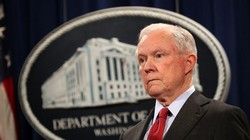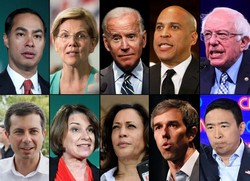Attorney General Jeff Sessions delivered his resignation letter to the White House at the request of the president, on Wednesday, Nov. 7.
President Donald Trump replaced Sessions with Matthew Whitaker, Sessions’s chief of staff, as acting attorney general, who has agreed with the president’s complaints about the special counsel investigation into Russia’s election interference.
The sudden change in cabinet has been raising questions about the future of the probe led by the special counsel Robert Mueller.
Sessions’ resignation immediately moves oversight of the ongoing investigation to interim successor Whitaker, who once called for the inquiry to be dramatically scaled back.
Christopher DeRosa, Ph.D., an associate professor of history, explained that Trump’s firing of Sessions is comparable to a similar motion made by former President Richard Nixon, who had requested his own Attorney General Elliot Richardson to resign when he did not obey the president’s order to fire special prosecutor Archibald Cox during the Watergate Scandal.
“Trump’s removal of Sessions is reminiscent of Richard Nixon’s attempts to evade justice during the Watergate Scandal in 1973,” said DeRosa.
“Republican operatives had broken into DNC headquarters during the 1972 election. Archibald Cox, the Special Prosecutor appointed to investigate the scandal by the Justice Department, subpoenaed Nixon’s Oval Office tapes,” he explained.
DeRosa continued to explain that Nixon tried to Cox to back off, and when he wouldn’t, Nixon ordered the Attorney General to fire him.
Attorney General Richardson and his deputy both refused, but the third-ranking man in the Justice Department complied and fired Cox.
“The move backfired: Congress strongly disapproved of Nixon’s brazen attempt to hide the tapes, and Nixon ultimately resigned to avoid his certain impeachment,” he said.
“Whether events will continue to unfold on analogous lines is of course uncertain. If Trump orders the Justice Department to fire Robert Mueller, he now has someone in place (Whitaker) who will do so, but whether the move would backfire to the same extent it did on Nixon is perhaps unlikely,” said DeRosa. “Unlike 45 years ago, the president’s party has already lined up against the investigation in any case.”
Sessions recused himself from the Russia probe in March 2017, for failing to disclose election-year meetings with Russian Ambassador Sergey Kislyak.
Sessions recusal, in addition to Trump’s sudden dismissal of FBI Director James Comey in May, prompted the appointment of former FBI Director Robert Mueller as the Justice Department’s special counsel to direct the inquiry against the president.
Deputy Attorney General Rod Rosenstein, who had been overseeing the probe, was at the White House during Sessions’ resignation for what administration officials described as a previously scheduled meeting.
With Whitaker assuming the new role of Attorney General, it is not immediately clear what is to be made of Mueller’s future and the continuation of his investigation.
Though some are concerned that Senate Republicans will unanimously support Trump’s potential ousting of the Mueller investigation, Senator-elect, Mitt Romney (R-Utah) has voiced his support of the probe.
After Sessions’ resignation, Romney tweeted: “I want to thank Jeff Sessions for his service to our country as Attorney General.
Under Acting Attorney General Matthew Whitaker, it is imperative that the important work of the Justice Department continues, and that the Mueller investigation proceeds to its conclusion unimpeded.”
Romney has also said in an interview with CNN that although he does not predict the president will fire Mueller, he warned that Congress would need to take action if Trump ever did move toward removing Mueller.
“I do not believe for a moment that President Trump will remove Mueller,” Romney said in the interview. “If he does remove Mueller, I believe that Congress will re-appoint him, and the most effective way to keep the investigation intact is for congressional leaders to make it clear to the President that if (Mueller) were removed by the executive branch, he would be rehired by the legislative branch. I presume that communication has happened already.”
PHOTO TAKEN from CNN Politics




